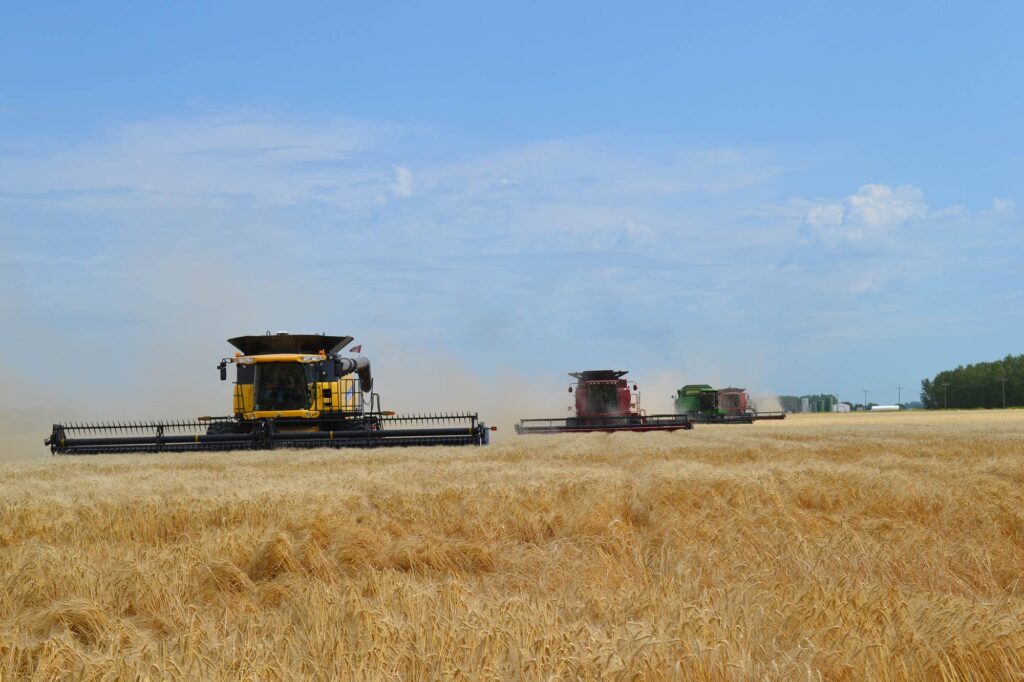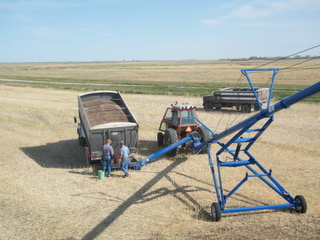
Working together for a common cause

A desire to support their global neighbours was the inspiration for Glen and Michele Erlandson to help start the River Plains Growing Project. For the past eight years, a group from Outlook, Saskatchewan has worked together to grow, tend and market a crop to raise funds to help end hunger around the world.
“The biggest inspiration is helping out your neighbour,” says Glen. “At the outset, [the inspiration] was this wealth we have in the ag sector in Canada and being able to share a part of that.”
Through growing projects, groups work together to grow a crop and donate the proceeds from the sale to Canadian Foodgrains Bank, a partnership of Canadian churches and church-based agencies working to end global hunger. The funds are used by the Foodgrains Bank member agencies—including Canadian Lutheran World Relief, to which the River Plains Growing Project designates their donation—for projects that are working towards ending hunger.
The goal of helping one’s neighbours—however near or far—is one that resonates with the local community. The project is grateful to the land owner, Arlo Larson, who offers use of the quarter section free of charge and for the support it receives from local businesses and the rural municipality. Community members often attend the harvest and the project organizes a fall potluck.
“People appreciate that opportunity to work together and get together for what can be a good common cause,” says Michele.
After reading an article in the Canada Lutheran about a growing project in Birch Hills, SK, Michele was inspired to explore the idea with the Erlandson’s congregation, Saskatchewan River Lutheran. The group also includes members from Bethlehem Lutheran Church, St. Andrew’s United Church and the local community.
“I appreciate the fact that [the support] is going to organizations that are well-established,” says Michele. “Canadian Lutheran World Relief and Canadian Foodgrains Bank are very well respected. It’s easy to track where the projects are and you can be fairly confident that it’s going for good purposes.”
Glen had the opportunity to visit several Foodgrains Bank sustainable agriculture and nutrition projects on a recent Foodgrains Bank learning tour to Rwanda. The visit affirmed his commitment to the River Plains Growing Project and he appreciated the opportunity to see projects firsthand.
“[The learning tour] builds my confidence in what’s being done—I’ll continue supporting and helping the project that we’ve got,” he says. “It makes you feel a lot better about what we’re doing—I can see the difference that it’s making for some people’s lives.”
With funding from the Foodgrains Bank, CLWR is working to end hunger in Ethiopia through projects that are supporting small-scale farmers by constructing irrigation systems, providing agricultural and marketing training, and protecting watersheds.
For those who are interested in starting a growing project, Glen suggests gathering a group that will manage the finances and input requirements and organize the work parties. The Foodgrains Bank’s regional representatives are available to offer information about starting a project.
In addition, Glen offers a final piece of advice:
“Do the best you can at growing the crop and ask God to bless it!”